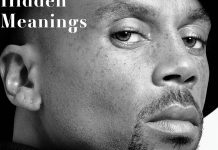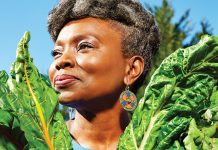
Photograph by Emma Trim
Writer Brit Bennett was just a college freshman when she started working on her debut novel, The Mothers. Since the book’s October release, Bennett, 26, has received numerous accolades, including the National Book Foundation’s 5 Under 35 award. The coming-of-age story examines how one teenage secret affects a tight-knit, middle-class black community in Oceanside, California. Nadia, a driven 17-year-old, begins dating the pastor’s son, Luke, to cope with grief over her mother’s suicide. When the fling results in a pregnancy, Nadia has an abortion that she hides from everyone in her life. The elder women of the church, the Mothers, narrate how this secret impacts their parish for years to come.
Bennett will read from the novel at Wrecking Bar as part of A Cappella Book’s Writers @ The Wrecking Bar series on February 13. She spoke to us about how the book evolved, Atlanta, and what she’s working on next.
Where did this story come from?
I knew young people in the church growing up. I wanted to write about a girl who had gotten pregnant with the pastor’s son and had an abortion. Originally, Nadia was a background character who had this really explosive secret. But her story became the most interesting part, so it moved to the center in a pretty dramatic way. There are some aspects of her personality that are really unlikable. She’s prickly, guarded, a smart-mouth, selfish, impulsive—very different from me in a lot of ways. But I had a writing professor ask me, “Why don’t you like her?” And I thought about what Nadia had survived and what she had lost; antiheroes are so interesting.
The book starts with an abortion. How did you approach writing this knowing the controversy surrounding it?
I knew it was inherently political to write about abortion, but I don’t think I ever thought about it as particularly controversial. I never envisioned a version where Nadia made a different choice. People have much more complex feelings about abortion than this political discourse would suggest. It’s a really complex issue that is often oversimplified. It’s been eye-opening and refreshing to have conversations at readings with both women and men. People are engaging complexly with an issue we often don’t talk about on a personal level.
You started writing this novel when you were 18. How did it evolve as you got older?
It changed a lot over time. Originally, I was interested in these characters as teens, but [as I came of age], the characters grew up alongside me. The addition of the Mothers as a narrative device came on a little bit later, when I was in grad school. I was interested in how the older characters would see these teenagers. That generation saw so much struggle [during] the civil rights era and [witnessed] the way the world changed around them—these teens are in a new world. I see the church mothers as a moral authority; they’re women who are often overlooked and not seen as powerful actors in the community, but they tell the story. I had fun channeling that older voice.
Some have seen this book as inherently political because of the characters’ race? Did you expect that reaction?
It’s been eye-opening [to me] that people have been surprised to see this type of story starring black characters. The question I get sometimes is, “Do the characters have to be black?” Their lives and experiences are inflected by race, but the plot doesn’t hinge on racism. People are also surprised it’s not set in the South, but black people live everywhere. [It revealed to me] what people think black stories are about. A lot of this reaction is representative of the stories we see in the media. Stories about blackness are often set in the past, like slave narratives or huge, historical moments of racism. One thing I love about the TV show Atlanta is that it’s just regular black people living their lives. There are whole episodes where the characters just talk about how to raise their children. It’s very telling that people find it shocking when you’re just seeing a contemporary story of black people living and having problems.
As the son of a preacher and a football star, Luke seems to examine the trope of black masculinity. Was this intentional?
Originally, he was a flat character who was kind of a jerk. His function in the story was an obstacle to be overcome. But I became really interested in him as a person with a rich interior and emotional life. Young black male characters aren’t afforded that often. Luke regrets Nadia’s decision [to have an abortion]; he felt he didn’t get to be part of the decision-making process. It was a perspective that was difficult to me to consider as a woman, but this young man reacts to this [pregnancy] in a way no one expects of him; he’s deeply mourning. Although he is a character who often does the wrong thing and causes a lot of the problems, we, the readers, have empathy. He’s alienated in the community for no other reason than [the fact that he is] the son of a preacher.
What are you working on now?
My next project is set in Louisiana, where my mom is from. It’s about a set of light-skinned black twins who take diverging life paths. I’m interested in colorism, in a Louisiana context, and the ways that race can be sort of a fiction but racism is not. Who is white and who is black—sometimes that distinction is so slight but has implications.
Is it intimidating to have such a lauded debut at 26?
At the end of the day, [when you’re working on a new project], it’s just you and the blank page, and it doesn’t care how your last book did and who liked it. With this new book, it’s been fun but also very scary to go from knowing what you’re going to do every day to sitting down and looking at blank page. I don’t know who these characters are yet, so it’s been very daunting, but also very exciting.













